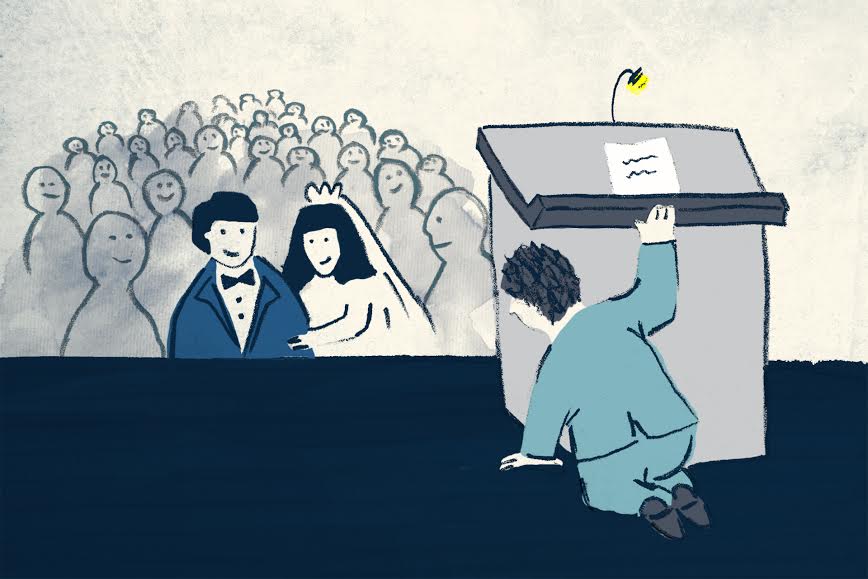Illustration by Andrew Seetoh for Rice
I am at that age where all my friends are getting married—just in time for them to produce two genetically robust children before the age of thirty-five. Having sat through many wedding speeches in recent years, the repeated cringing has trained me to understand what works and what doesn’t. I have also delivered a few myself, which speaks less to my credibility than my capacity to empathize.
Everyone’s writing and conversational voices tend to be wildly different, and this is particularly true with Singaporeans. When we write, we are used to forming complete and grammatically sound sentences, with no trace of Singlish. If we were to read our writing out loud, it would sound like we were impersonating our English teachers or Channel News Asia anchors. I recommend that you turn off grammar and spell check on Word, and write your speech like you were talking to a friend.
Even then, when you read back what you wrote, you’d probably catch yourself going off script or including colloquial word whiskers. Good: write in these “mistakes” into your final memorized speech. Feel free to include that odd transition of “yeah…so”, or that “meh” that ends one sentence—this process translates your writing voice to your speaking voice. This also gives you an accurate sense of tone, ensuring that you don’t go overboard with Singlish while still sounding like yourself.
Wedding toasts in movies always seem off the cuff and charming, and that is not you and me. Always memorise your script, but also have it in front of you on the wedding night. Unless you do this for a living—say you are a pastor, stand-up comedian, or Anthony Robbins—trust that the fear of forgetting your lines will come in the way of confident delivery. The script is there for you to lean on from time to time, alternating between glancing down and looking up at the audience.
Most importantly, there shall be no mention of the bachelor or bachelorette party.
Reduce distractions by only making eye contact with the wedding couple throughout the speech—they are the least likely to be whispering to friends or checking their phones. They also tend to be more generous with knowing nods and audible laughter, which can be extremely encouraging to witness while you are up on stage.
Always keep in mind that speaking at your friend’s wedding is a form of public service, to the couple, to their family, and to the occasion of celebration. It is not about how witty you can be, how amazingly close you are to the bride, nor how much you drank that night.
Remember that you are speaking to a room full of people and not directly to the wedding couple. Most in the audience are not college friends privy to the couple’s sordid dating history, but are relatives or neighbours from the couple’s pre-puberty childhood.
Therefore, rid yourself of all bawdy inside jokes, or anecdotes that make you laugh on stage. I have found these stories to be a lot less funny when not experienced first-hand. Most importantly, there shall be no mention of the bachelor or bachelorette party.
Going for knee-slapping funny is not worth the risk.
Nuanced statements like, “…Sylvia, we may not always agree on things, but…” are never necessary. Just go straight to the compliment; no one is going to give you props for being fair and balanced. Defer all accusations of hypocrisy to the wedding cake. It’s a happy occasion, come on.
Like in the types of art where beauty lies in the negative space, the core of a great wedding speech is being aware of what not to say. I like speeches that are short, appropriately warm (inside smiles, no tears), and include a few moments of chuckle-level jokes. Going for knee-slapping funny is not worth the risk, and even if pulled off successfully, there is always someone in the room that loses. Just look for it.
Last month, I was back at another wedding, randomly swiping at my phone to avoid the discomfort of watching a grown man cry on stage. However, just as he started describing his love for his wife, I found myself looking up.
He was speaking to her directly like there was no one else in the room. In such moments of vulnerability, the words coming out of the groom’s mouth didn’t matter. The hall fell silent, everyone riveted. His sincerity had cut through any awkwardness and he seemed so happy. I put my phone down and thought to myself, what a lucky guy.








